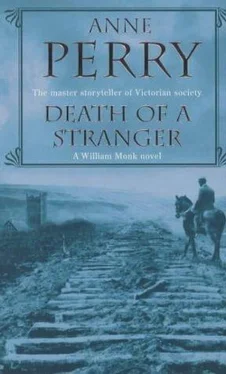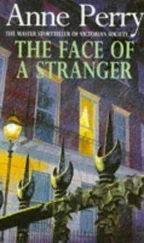Hester had spent a strange, unhappy evening after Monk’s return, aware that there was something powerful in him that she could not reach. He was either unwilling or unable to share it. She had missed him while he was away, and taken the opportunity to put in as much work as possible at the house on Coldbath Square, and she would have been happy to go there far later, or even not at all, had he said only once that he wished her to stay.
But he did not. He was brittle, absorbed in thought, and he seemed almost relieved when she said good-bye just before ten o’clock and went out into the lamp-lit darkness and took the first passing hansom to Coldbath Square.
The night was chill and she was glad of the warmth that enveloped her when she pushed the door of the clinic open and went inside. Bessie was sitting at the table stitching buttons onto a white blouse, and she looked up, her face filling with pleasure when she saw Hester.
“Yer look pinched,” she said with concern. “Nice ’ot cup o’ tea’ll do yer good.” She put the sewing down and rose to her feet. “Like a drop o’ the ’ard stuff with it?” She did not even reach for it, knowing Hester would refuse. She always did, but Bessie always offered. It was a sort of ritual.
“No, thank you,” Hester replied with a smile, hanging her damp coat on the hook on the wall. “But don’t let me stop you.”
That was ritual also. “Now that you mention it,” Bessie agreed, “don’t mind if I do.” She went to the stove to make sure the kettle was on the boil, and Hester went to look at the patients.
Fanny, the girl who had been stabbed, was feverish and in a great deal of pain, but she appeared to be no worse than Hester had expected. Wounds like that did not heal easily. Her fever seemed to be down.
“Have you eaten anything?” Hester asked her.
Fanny nodded. “Nearly,” she whispered. “I had some beef broth. Thank you.”
Bessie was coming toward them, a wide, benign shadow between the beds, away from the light of the far end of the room.
“Mr. Lockhart was right pleased with ’er,” she said with pleasure. “ ’E come about midday. Sober as a judge.” She added that last bit with pride, as if it were partially her achievement. Perhaps it was.
“Did you give him luncheon?” Hester asked without looking up at Bessie.
“What if I did?” Bessie demanded. “We can spare’im a bit o’ bubble an’ squeak, an’ a sausage or two!”
Hester smiled, knowing Bessie had brought it out of her own meager pantry. “Of course we can,” she agreed, pretending she did not know. “Small enough reward for all he does.”
“Yer right!” Bessie said vehemently, darting a slightly suspicious look at Hester, and then away again. “An’ ’e looked at Alice, an’ all, poor thing. Said as she’s doin’ as well as yer could expect. Spent a fair time talkin’ to ’er. ’E an’ Miss Margaret put arnica poultices on ’er, jus’ like me an’ yer did, an’ it seemed ter ’elp ’er some.” There was fear in Bessie’s voice. Hester knew she wanted to ask if Alice was going to live, and yet she was too afraid of the answer to do it.
The fact that Alice had already survived three days since her injuries was the most hopeful sign. Had there been the internal bleeding they feared, she would have been dead by now.
Hester went to her and saw that she was half asleep, dozing fitfully, muttering under her breath as if troubled by dreams. There was nothing to do to help her. Either her body would heal in time, or she would develop fever or gangrene and die. In a while, when she was more wakeful, they would give her a little more to drink, then sponge her down with cool water and give her a fresh nightgown.
Hester returned to the table at the far end of the room where Bessie was allowing the tea to brew and putting a generous dash of whiskey into her own mug.
There were still police on every street in the Coldbath area, harassing people, asking questions. Hester had noticed them, looking profoundly unhappy but unable to escape the necessity. Most of them were locally based and knew the women-and the men who regularly came to take their pleasures, although in the current climate there were fewer and fewer of them. Business was poor in other trades as well; all those on the edge of the law were nervous and tempers were short. There was no money to be spared for small treats like peppermint water, flowers, ham sandwiches, a new hat, a toy for a child. Sellers of matches and bootlaces were about the only ones doing well.
A little before midnight Jessop called again, pressing for higher rent. He stood in the middle of the floor with his thumbs hooked into the armholes of his red brocade waistcoat, trying to add restrictions and generally making a nuisance of himself. The few women who were hurt or ill had already complained of his presence, and would do so again if he kept on coming. He made them wary; he represented authority, no matter how distantly. Hester pointed that out to him and asked him to leave. He smiled with satisfaction and remained the longer, until Bessie lost her temper and filled the bucket with hot water, lye, and vinegar. She started to scrub the floor, splashing the bucket’s contents all over his boots deliberately, and he left in umbrage. Bessie then made a very slapdash effort at cleaning a couple of yards of the floor, then threw the good water away. She and Hester curled up on two of the empty beds and slept on and off, undisturbed by patients for most of the night, only getting up twice to help Alice.
“I put a weapon into his hand, didn’t I!” Margaret said with chagrin when Hester told her about Jessop’s visit early on the following morning when she arrived just after nine o’clock, and Bessie had gone for some shopping.
Margaret was too honest for Hester to patronize her with an excuse. Today of all days she felt a burning need for candor.
“I’m afraid so,” she agreed, but with a rueful smile to rob it of offense. They were busy seeing what bandages could be saved from those used and washed. They were not in a position to afford any unnecessary supplies. “But I don’t think it will make any difference in a while. We’ll have to find a new place as soon as we can. He’ll put us out at the first opportunity. He was always going to do that.”
Margaret did not reply. Her fingers moved nimbly over the rolls of cloth, sorting some out and throwing them away, keeping the others. “What are we going to do about the usurer and the women who are being beaten?” she said at last.
Hester had been thinking about just that since she had first learned the truth from Alice, and had come to the conclusion that by themselves there was nothing they could do that did not risk making the situation worse. The usury was not a crime that the law could reach in the ordinary way. She had toyed with other ideas, but never formed any coherent plan they might be capable of carrying out.
This morning she felt even more helpless in the face of pain, because her own happiness was dimmed, her confidence in herself shadowed by the fact that Monk had placed a distance between them. Something hurt him, and he was not able to share it with her.
“We need help,” she said aloud. Already her mind was made up. “Someone who knows the law far better than we do.”
“Mr. Monk?” Margaret said quickly.
“No, I meant a lawyer.” Hester refused to allow herself to be hurt by the thought that it was not Monk she would turn to. “Someone who knows about usury, and that kind of thing,” she answered. “I think we should go as soon as legal offices will be open. Bessie will be back by then, and it is not very likely anyone will come in during the morning who can’t wait for us to return.”
“But who could we find who would be interested in cases like Fanny or Alice?” Margaret asked. “And we have no spare money to pay with. Everything is already committed to rent and supplies.” She said that firmly, just in case Hester should be inclined to be impractical and forget their priorities.
Читать дальше












